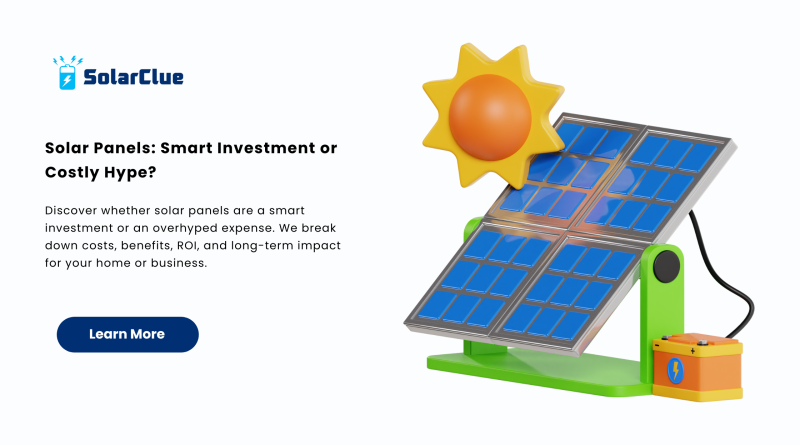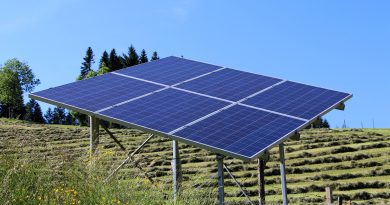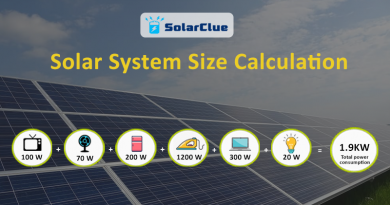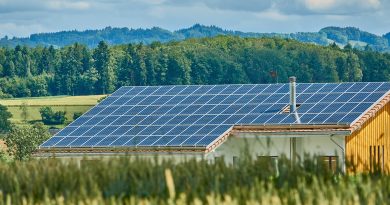Solar Panels: Smart Investment or Costly Hype?
The idea of switching to solar panels has become increasingly popular in India and worldwide. But the real question remains — Are solar panels truly a smart investment or just a costly hype? With the rising electricity bills, environmental concerns, and growing awareness of renewable energy, it’s only fair that homeowners and business owners want clarity before making the switch. In this blog, we’ll take a closer look at whether solar panels live up to the buzz, assess the true cost vs benefit, and help you decide if installing a solar power system makes sense for you.
Table of Contents
- 1 Understanding the Basics of Solar Panels
- 2 What Makes Solar Panels So Popular?
- 3 Initial Investment vs Long-Term Savings
- 4 When Are Solar Panels a Smart Investment?
- 5 When Could Solar Be a Costly Hype?
- 6 Top Benefits of Installing the Best Solar Panel
- 7 Environmental Impact: Not Just Financial Gains
- 8 Common Myths Around Solar Panels
- 9 Should You Go Solar? Final Verdict
- 10 FAQs
Understanding the Basics of Solar Panels
Solar panels work by converting sunlight into electricity using the photovoltaic effect. When installed properly and used with an inverter, these panels can power your home or business with clean, renewable energy. The system is generally referred to as a solar power system, and can be connected to the grid (on-grid), work independently (off-grid), or include hybrid options with battery storage.
What Makes Solar Panels So Popular?
-
Reduced Electricity Bills
-
Low Maintenance Costs
-
Long-Term Durability (25+ Years Lifespan)
-
Environmental Benefits (Reduced Carbon Footprint)
-
Government Subsidies & Tax Benefits in India
These benefits paint a very promising picture — but are they enough to prove solar panels are worth the investment?
Initial Investment vs Long-Term Savings
Cost of Installation
A quality solar panel for home can cost between ₹45,000 to ₹70,000 per kW, including the inverter and mounting structures. A typical 3kW setup, suitable for an average Indian home, may cost around ₹1.5 to ₹2 lakhs.
Subsidies Reduce the Burden
The Indian government, through MNRE and DISCOMs, provides subsidies of up to 40% on small rooftop installations, significantly lowering upfront costs.
Return on Investment (ROI)
With reduced power bills (sometimes up to 90%) and minimal maintenance, most users recover their investment in solar panels within 5 to 7 years. After this, the system generates practically free electricity for another 15–20 years, resulting in massive savings.
When Are Solar Panels a Smart Investment?
1. You Own Your Property
Solar installation is most suitable for property owners with adequate roof space and sunlight exposure. If you’re renting, this may not be ideal unless the landlord is involved.
2. Your Electricity Bills Are High
If you’re paying ₹2,000–₹5,000 or more monthly on electricity, switching to solar energy can drastically reduce your outflow and provide high ROI.
3. You’re Looking at Long-Term Financial Planning
While the initial cost might seem steep, the long-term financial benefits make solar panels a smart investment, especially as grid electricity continues to become costlier each year.
When Could Solar Be a Costly Hype?
1. Poor Roof Conditions or Shaded Areas
If your roof isn’t structurally sound or receives limited sunlight due to tall buildings or trees, your solar panel efficiency will be low, making the system less effective.
2. Frequent Relocation
Since solar panel systems are semi-permanent, frequently relocating may make it difficult to justify the cost unless you plan to reinstall it every time — which is an added cost.
3. Unrealistic Expectations
Thinking solar energy will make you completely independent from the grid overnight is a misconception. While battery storage is an option, it significantly increases costs and requires careful sizing and planning.
Top Benefits of Installing the Best Solar Panel
Choosing the best solar panel for your needs ensures:
-
Higher Efficiency and Output
-
Longer Warranty and Life Span
-
Better Resistance to Weather Damage
-
Strong Brand Support and After-Sales Service
Investing in premium brands might seem costly initially, but it provides peace of mind and reliable performance in the long run.
Environmental Impact: Not Just Financial Gains
Beyond savings, solar energy contributes significantly to reducing your carbon footprint. One average home solar setup can eliminate 1 to 2 tons of CO₂ annually, contributing to a greener planet. So if you’re someone who values sustainability and climate responsibility, installing solar panels is a meaningful step in the right direction.
Common Myths Around Solar Panels
Myth 1: Solar Panels Don’t Work on Cloudy Days
Truth: They do. Though energy generation drops, panels still produce electricity from indirect sunlight.
Myth 2: Maintenance is Difficult and Expensive
Truth: Solar systems require minimal upkeep — just occasional cleaning and annual checks.
Myth 3: Solar Energy Can’t Run Big Appliances
Truth: A properly sized solar power system can run everything from lights to refrigerators and air conditioners.
Should You Go Solar? Final Verdict
If you:
-
Own your property
-
Face high electricity bills
-
Plan to stay long-term
-
Have a suitable roof
-
Believe in eco-conscious living
Then installing solar panels is undoubtedly a smart investment — not just for your wallet, but for the environment too. On the other hand, if your roof isn’t viable, or you’re frequently moving, it might be wise to explore alternative solutions until you settle permanently.
FAQs
Q1. What is the lifespan of solar panels?
Most quality solar panels last between 25 to 30 years with minimal degradation in performance.
Q2. Can solar panels work during power outages?
Only off-grid or hybrid solar power systems with battery storage work during outages. On-grid systems do not function when the grid is down unless you add backup.
Q3. Is solar energy completely free once installed?
While the sunlight is free, you may still incur minimal maintenance costs and service charges.
Q4. How do I choose the best solar panel for home use?
Look for BIS-certified products, at least 15% efficiency, 25-year warranty, and reputable brands that offer strong after-sales support.
Q5. Can I install solar panels myself?
While DIY is possible, it’s recommended to hire professionals to ensure safety, proper installation, and warranty validity.
If you’re serious about saving on electricity bills and doing your bit for the environment, there’s never been a better time to explore solar solutions. Visit our website solarclue.com or dive into our insights at blog.solarclue.com — your guide to smarter solar decisions.




